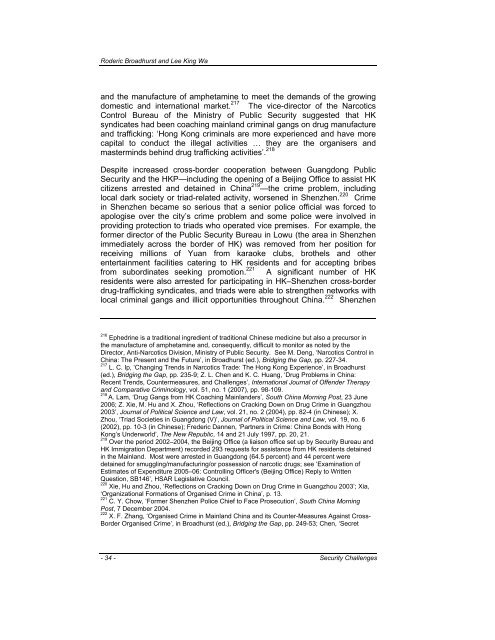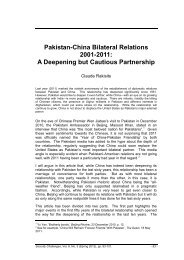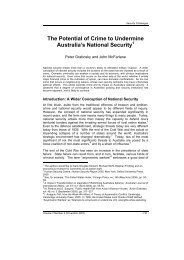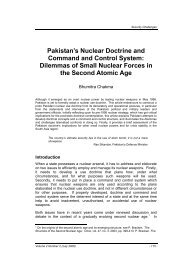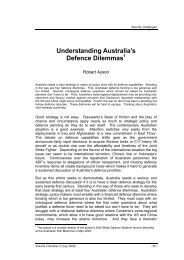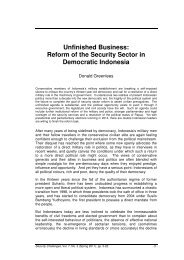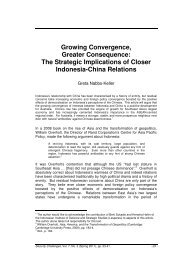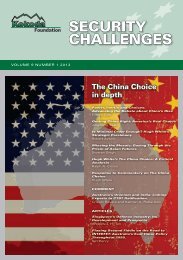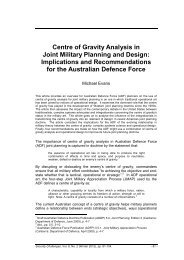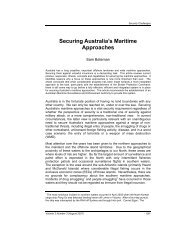The Transformation of Triad - Security Challenges
The Transformation of Triad - Security Challenges
The Transformation of Triad - Security Challenges
Create successful ePaper yourself
Turn your PDF publications into a flip-book with our unique Google optimized e-Paper software.
Roderic Broadhurst and Lee King Wa<br />
and the manufacture <strong>of</strong> amphetamine to meet the demands <strong>of</strong> the growing<br />
domestic and international market. 217 <strong>The</strong> vice-director <strong>of</strong> the Narcotics<br />
Control Bureau <strong>of</strong> the Ministry <strong>of</strong> Public <strong>Security</strong> suggested that HK<br />
syndicates had been coaching mainland criminal gangs on drug manufacture<br />
and trafficking: ‘Hong Kong criminals are more experienced and have more<br />
capital to conduct the illegal activities … they are the organisers and<br />
masterminds behind drug trafficking activities’. 218<br />
Despite increased cross-border cooperation between Guangdong Public<br />
<strong>Security</strong> and the HKP—including the opening <strong>of</strong> a Beijing Office to assist HK<br />
citizens arrested and detained in China 219 —the crime problem, including<br />
local dark society or triad-related activity, worsened in Shenzhen. 220 Crime<br />
in Shenzhen became so serious that a senior police <strong>of</strong>ficial was forced to<br />
apologise over the city’s crime problem and some police were involved in<br />
providing protection to triads who operated vice premises. For example, the<br />
former director <strong>of</strong> the Public <strong>Security</strong> Bureau in Lowu (the area in Shenzhen<br />
immediately across the border <strong>of</strong> HK) was removed from her position for<br />
receiving millions <strong>of</strong> Yuan from karaoke clubs, brothels and other<br />
entertainment facilities catering to HK residents and for accepting bribes<br />
from subordinates seeking promotion. 221 A significant number <strong>of</strong> HK<br />
residents were also arrested for participating in HK–Shenzhen cross-border<br />
drug-trafficking syndicates, and triads were able to strengthen networks with<br />
local criminal gangs and illicit opportunities throughout China. 222 Shenzhen<br />
216<br />
Ephedrine is a traditional ingredient <strong>of</strong> traditional Chinese medicine but also a precursor in<br />
the manufacture <strong>of</strong> amphetamine and, consequently, difficult to monitor as noted by the<br />
Director, Anti-Narcotics Division, Ministry <strong>of</strong> Public <strong>Security</strong>. See M. Deng, ‘Narcotics Control in<br />
China: <strong>The</strong> Present and the Future’, in Broadhurst (ed.), Bridging the Gap, pp. 227-34.<br />
217<br />
L. C. Ip, ‘Changing Trends in Narcotics Trade: <strong>The</strong> Hong Kong Experience’, in Broadhurst<br />
(ed.), Bridging the Gap, pp. 235-9; Z. L. Chen and K. C. Huang, ‘Drug Problems in China:<br />
Recent Trends, Countermeasures, and <strong>Challenges</strong>’, International Journal <strong>of</strong> Offender <strong>The</strong>rapy<br />
and Comparative Criminology, vol. 51, no. 1 (2007), pp. 98-109.<br />
218<br />
A. Lam, ‘Drug Gangs from HK Coaching Mainlanders’, South China Morning Post, 23 June<br />
2006; Z. Xie, M. Hu and X. Zhou, ‘Reflections on Cracking Down on Drug Crime in Guangzhou<br />
2003’, Journal <strong>of</strong> Political Science and Law, vol. 21, no. 2 (2004), pp. 82-4 (in Chinese); X.<br />
Zhou, ‘<strong>Triad</strong> Societies in Guangdong (V)’, Journal <strong>of</strong> Political Science and Law, vol. 19, no. 6<br />
(2002), pp. 10-3 (in Chinese); Frederic Dannen, ‘Partners in Crime: China Bonds with Hong<br />
Kong’s Underworld’, <strong>The</strong> New Republic, 14 and 21 July 1997, pp. 20, 21.<br />
219<br />
Over the period 2002–2004, the Beijing Office (a liaison <strong>of</strong>fice set up by <strong>Security</strong> Bureau and<br />
HK Immigration Department) recorded 293 requests for assistance from HK residents detained<br />
in the Mainland. Most were arrested in Guangdong (64.5 percent) and 44 percent were<br />
detained for smuggling/manufacturing/or possession <strong>of</strong> narcotic drugs; see ‘Examination <strong>of</strong><br />
Estimates <strong>of</strong> Expenditure 2005–06: Controlling Officer's (Beijing Office) Reply to Written<br />
Question, SB146’, HSAR Legislative Council.<br />
220<br />
Xie, Hu and Zhou, ‘Reflections on Cracking Down on Drug Crime in Guangzhou 2003’; Xia,<br />
‘Organizational Formations <strong>of</strong> Organised Crime in China’, p. 13.<br />
221<br />
C. Y. Chow, ‘Former Shenzhen Police Chief to Face Prosecution’, South China Morning<br />
Post, 7 December 2004.<br />
222<br />
X. F. Zhang, ‘Organised Crime in Mainland China and its Counter-Measures Against Cross-<br />
Border Organised Crime’, in Broadhurst (ed.), Bridging the Gap, pp. 249-53; Chen, ‘Secret<br />
- 34 - <strong>Security</strong> <strong>Challenges</strong>


